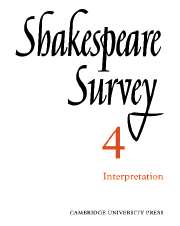Book contents
- Frontmatter
- Fifty Years of Shakespearian Criticism: 1900–1950
- Motivation in Shakespeare’s Choice of Materials
- The Sources of Macbeth
- Shakespeare and the ‘Ordinary’ Word
- Malone and the Upstart Crow
- An Early Copy of Shakespeare's Will
- The Shakespeare Collection in the Bodleian Library, Oxford
- Was there a ‘Tarras’ in Shakespeare’s Globe?
- Tradition, Style and the Theatre To-day
- Shakespeare in Slovakia
- Shakespeare in Post-War Yugoslavia
- International Notes
- Shakespeare’s Comedies and the Modern Stage
- The Year's Contributions to Shakespearian Study 1 Critical Studies
- 2 Shakespeare’s Life, Times and Stage
- 3 Textual Studies
- Book Received
- Index
- Plate Section
Malone and the Upstart Crow
Published online by Cambridge University Press: 28 March 2007
- Frontmatter
- Fifty Years of Shakespearian Criticism: 1900–1950
- Motivation in Shakespeare’s Choice of Materials
- The Sources of Macbeth
- Shakespeare and the ‘Ordinary’ Word
- Malone and the Upstart Crow
- An Early Copy of Shakespeare's Will
- The Shakespeare Collection in the Bodleian Library, Oxford
- Was there a ‘Tarras’ in Shakespeare’s Globe?
- Tradition, Style and the Theatre To-day
- Shakespeare in Slovakia
- Shakespeare in Post-War Yugoslavia
- International Notes
- Shakespeare’s Comedies and the Modern Stage
- The Year's Contributions to Shakespearian Study 1 Critical Studies
- 2 Shakespeare’s Life, Times and Stage
- 3 Textual Studies
- Book Received
- Index
- Plate Section
Summary
The Three Parts of Henry VI, unquestionably written before the beginning of March 1592, as I hope to show on a later occasion, are, if Shakespeare’s, probably the earliest productions we have from his pen. But are they his? And if so, are they his entirely? Their inclusion in the First Folio shows that Heminges and Condell considered him to be, at least in part, responsible for them all. On the other hand, it is impossible to deny their unequal quality; poor scenes and pedestrian or over-pretentious verse being interspersed with scenes and verse which all but extreme disintegrators accept as authentic Shakespeare. In 1790 Malone offered an explanation of this state of affairs which satisfied most students until twenty years ago. The trilogy, he argued, was originally composed by two or more of Shakespeare’s immediate predecessors (he suspected Greene and Peele) and was afterwards rehandled and in part rewritten by him. These views he set forth in A Dissertation on the Three Parts of Henry VI, which, apart from Farmer’s Essay on the Learning of Shakespeare, 1767, was the earliest and most elaborate treatise yet written on a single point of Shakespearian scholarship and was pronounced on its appearance by no less distinguished a scholar than Porson to be “one of the most convincing pieces of criticism he had ever met with”. That it no longer convinces is due to the disproof of a proposition which held a conspicuous place in the thesis.
- Type
- Chapter
- Information
- Shakespeare Survey , pp. 56 - 68Publisher: Cambridge University PressPrint publication year: 1951

